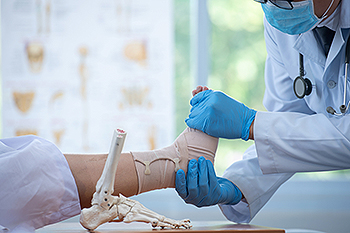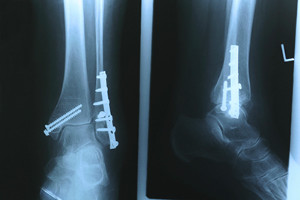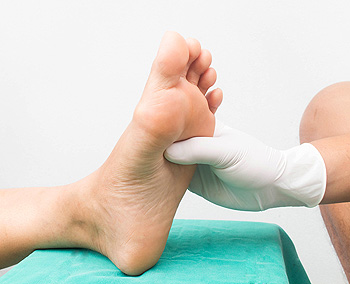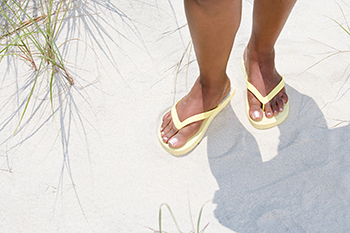Stuart (772) 223-8313Rate Us
Jupiter (561) 744-6683Rate Us
Stuart (772) 223-8313Rate Us
Jupiter (561) 744-6683Rate Us

A broken foot can cause severe pain and discomfort. It usually happens suddenly, often as a result of a car accident, a fall, or if a heavy object should fall on the foot. The symptoms that many people experience with a broken foot include extreme pain, swelling, and the ankle and surrounding areas can be bruised. If the fracture is severe, the bone may protrude through the skin, and can look deformed. Additionally, it is often difficult to walk, and immediate medical attention is often sought. A proper diagnosis is generally performed, and this is helpful in ruling out sprains. Numbness and a tingling sensation may accompany the broken foot, and it may feel cold and look red. Most broken feet are treated by wearing a cast or a walking boot, which can provide the stability that is needed as the healing process takes place. A general time frame for complete healing is approximately six weeks, and many people use crutches that can help to take the weight off of the foot. If you have endured a broken foot, please consult with a podiatrist who can help you with the right treatment, so you can start to feel better.
A broken foot requires immediate medical attention and treatment. If you need your feet checked, contact one of our podiatrists from Advanced Foot & Ankle Specialists, PA. Our doctors can provide the care you need to keep you pain-free and on your feet.
Broken Foot Causes, Symptoms, and Treatment
A broken foot is caused by one of the bones in the foot typically breaking when bended, crushed, or stretched beyond its natural capabilities. Usually the location of the fracture indicates how the break occurred, whether it was through an object, fall, or any other type of injury.
Common Symptoms of Broken Feet:
Those that suspect they have a broken foot shoot seek urgent medical attention where a medical professional could diagnose the severity.
Treatment for broken bones varies depending on the cause, severity and location. Some will require the use of splints, casts or crutches while others could even involve surgery to repair the broken bones. Personal care includes the use of ice and keeping the foot stabilized and elevated.
If you have any questions please feel free to contact one of our offices located in Stuart and Jupiter, FL . We offer the newest diagnostic and treatment technologies for all your foot and ankle needs.

Many individuals who take their health seriously make a special effort to look after the state of their feet on a daily basis. Having some sort of everyday foot care routine can be a very helpful way to maintain healthy feet and prevent complications from arising. There is certainly no shortage of recommended things to incorporate into your foot care routine. However, equally important are things to avoid doing every day that could negatively impact the health of your feet. First, you might avoid ignoring any pain or problems in your feet. Sometimes, you might feel tempted to dismiss any discomfort that could arise in your feet. However, it can be better to have a medical professional, such as a podiatrist, examine your feet when you notice anything abnormal. Second, you usually ought not to wear the same pair of shoes and socks day after day. When an individual fails to alternate their shoes and socks, it becomes very easy for bacteria, odors, and infections to take hold. Additionally, the sweat that accumulates when one fails to alternate shoes and socks can cause complications. These are just some of the many things that most people ought to avoid as part of their everyday foot care routine. For more information, please contact your podiatrist.
Everyday foot care is very important to prevent infection and other foot ailments. If you need your feet checked, contact one of our podiatrists from Advanced Foot & Ankle Specialists, PA. Our doctors can provide the care you need to keep you pain-free and on your feet.
Everyday Foot Care
Often, people take care of their bodies, face and hair more so than they do for their feet. But the feet are a very important aspect of our bodies, and one that we should pay more attention to. Without our feet, we would not be able to perform most daily tasks.
It is best to check your feet regularly to make sure there are no new bruises or cuts that you may not have noticed before. For dry feet, moisturizer can easily be a remedy and can be applied as often as necessary to the affected areas. Wearing shoes that fit well can also help you maintain good foot health, as well as making it easier to walk and do daily activities without the stress or pain of ill-fitting shoes, high heels, or even flip flops. Wearing clean socks with closed shoes is important to ensure that sweat and bacteria do not accumulate within the shoe. Clean socks help to prevent Athlete’s foot, fungi problems, bad odors, and can absorb sweat.
If you have any questions please feel free to contact one of our offices located in Stuart and Jupiter, FL . We offer the newest diagnostic and treatment technologies for all your foot and ankle needs.

A stress fracture is caused by a bone being subjected to repeated actions, which can cause serious injury to the bone over time. Stress fractures are common in the feet and ankles. With repetitive foot actions, particularly common among athletes, the body is unable to send enough calcium to the stressed bone, and cracks might develop in the bone over time. Stress fractures might be hard to notice at first because they occur gradually, but one might notice chronic pain or night aches that do not go away after rest. The area affected might feel tender, weak, numb, and become bruised or swollen. It look deformed in some way at the site of the stress fracture, and it be hard to bear weight or move normally. If you feel this type of pain in your foot or ankle, especially if you feel a tingling or pins and needles feeling at the site of injury, see a podiatrist who can properly diagnose the problem and provide appropriate treatment.
Activities where too much pressure is put on the feet can cause stress fractures. To learn more, contact one of our podiatrists from Advanced Foot & Ankle Specialists, PA. Our doctors can provide the care you need to keep your pain free and on your feet.
Dealing with Stress Fractures of the Foot and Ankle
Stress fractures occur in the foot and ankle when muscles in these areas weaken from too much or too little use. The feet and ankles then lose support when walking or running from the impact of the ground. Since there is no protection, the bones receive the full impact of each step. Stress on the feet can cause cracks to form in the bones, thus creating stress fractures.
What Are Stress Fractures?
Stress fractures occur frequently in individuals whose daily activities cause great impact on the feet and ankles. Stress factors are most common among:
Symptoms
Pain from the fractures occur in the area of the fractures and can be constant or intermittent. It will often cause sharp or dull pain with swelling and tenderness. Engaging in any kind of activity which involves high impact will aggravate pain.
If you have any questions please feel free to contact one of our offices located in Stuart and Jupiter, FL . We offer the newest diagnostic and treatment technologies for all your foot and ankle needs.

Peripheral neuropathy is a condition that primarily affects the nerves of the body by making you feel abnormal sensations or fail to feel sensations that you should be feeling. This condition can affect nerves throughout the body, but it can also affect the feet, which can be particularly uncomfortable. The nerve damage in the feet can make you feel a variety of symptoms. These symptoms might include a feeling of numbness in the feet, a “pins and needles” feeling, periodic shooting pains, and difficulty balancing on your feet, among many other things. Importantly, if you have neuropathy in your feet, it can be a good idea to take extra precautions for your feet. For example, check them regularly to ensure that they have not gotten an injury that you did not notice or feel. Also, you might consider being extra diligent about keeping them warm and well-covered during colder winter months, as neuropathy can interfere with the feet’s sensitivity to cold weather. If you or a loved one suffer from neuropathy in the feet, contact a podiatrist.
Neuropathy
Neuropathy can be a potentially serious condition, especially if it is left undiagnosed. If you have any concerns that you may be experiencing nerve loss in your feet, consult with one of our podiatrists from Advanced Foot & Ankle Specialists, PA. Our doctors will assess your condition and provide you with quality foot and ankle treatment for neuropathy.
What Is Neuropathy?
Neuropathy is a condition that leads to damage to the nerves in the body. Peripheral neuropathy, or neuropathy that affects your peripheral nervous system, usually occurs in the feet. Neuropathy can be triggered by a number of different causes. Such causes include diabetes, infections, cancers, disorders, and toxic substances.
Symptoms of Neuropathy Include:
Those with diabetes are at serious risk due to being unable to feel an ulcer on their feet. Diabetics usually also suffer from poor blood circulation. This can lead to the wound not healing, infections occurring, and the limb may have to be amputated.
Treatment
To treat neuropathy in the foot, podiatrists will first diagnose the cause of the neuropathy. Figuring out the underlying cause of the neuropathy will allow the podiatrist to prescribe the best treatment, whether it be caused by diabetes, toxic substance exposure, infection, etc. If the nerve has not died, then it’s possible that sensation may be able to return to the foot.
Pain medication may be issued for pain. Electrical nerve stimulation can be used to stimulate nerves. If the neuropathy is caused from pressure on the nerves, then surgery may be necessary.
If you have any questions, please feel free to contact one of our offices located in Stuart and Jupiter, FL . We offer the newest diagnostic and treatment technologies for all your foot care needs.

Many people choose to wear flip flops in the warmer months because of the many styles to choose from and their simplicity to wear. However, wearing flip flops can be harmful to the feet. Some of the ways the feet can be negatively affected include having a different gait, or walking style, and the toes can cramp from trying to keep the shoe on the foot. Additionally, the skin on the heels can become dry and cracked from frequently wearing this backless shoe, and the ankles may start to point inward. They typically do not provide any type of arch support, and if these types of shoes must be worn, it is suggested that they be worn for short periods of time. They are appropriate to wear to the beach, but are frowned upon if worn all day. If you would like additional information about how wearing flip flops can affect the feet, please speak with a podiatrist who can address any concerns you may have.
Flip-flops are not always the best choice of footwear. If you have any concerns about your feet or ankles, contact one of our podiatrists from Advanced Foot & Ankle Specialists, PA. Our doctors will assist you with all of your foot and ankle needs.
Flip-Flops and Feet
When the weather starts warming up, people enjoy wearing flip-flops. Flip-flops are comfortable, stylish, and easy to slip on and off; they're perfect for any summer beach goer. However, these shoes can cause harm to the feet.
How Can Flip-Flops Affect Me Long-Term?
Are There Injuries Associated with Flip-Flops?
Yes. Since flip-flops are relatively weak and do not provide the same amount of support as sneakers, people who wear flip-flops regularly are more susceptible to injuries. On top of that, the open nature of the shoe makes your feet more prone to other problems, such as cuts and even infections. Common injuries and ailments include:
I like Wearing Flip-Flops. Are There Safe Alternatives?
When buying flip-flops, try to find ones that have sturdy soles and that are made of high-quality materials that will support for your feet. These flip-flops will cost more but will also last longer as a result.
If you have any questions please feel free to contact one of our offices located in Stuart and Jupiter, FL . We offer the newest diagnostic and treatment technologies for all your foot and ankle needs.